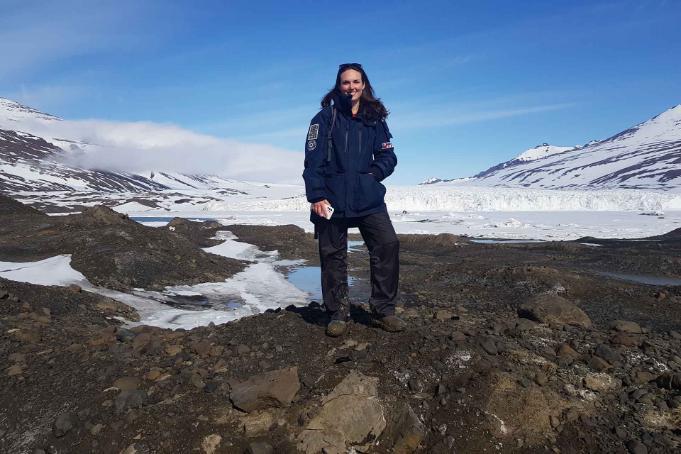Meet Dr Hannah Whitby
Dr Hannah Whitby is a senior lecturer in the Department of Earth, Ocean and Ecological Sciences, specialising in the cycling of metals in aquatic environments and their impact on marine and terrestrial ecosystems.
- Name – Dr Hannah Whitby
- Position – Senior Lecturer, Department of Earth, Ocean and Ecological Sciences
- Group Name – Ocean Science
- Joined University of Liverpool –2020 (plus BSc 2008-2012; PhD 2012-2016)
- Born – North Wales, UK
- PhD – University of Liverpool, UK

What is your research about?
My research focuses on the cycling of metals through aquatic environments as either toxicants or nutrients, and how their interactions with organic matter can control their behaviour and bioavailability to organisms, impacting aquatic life and water quality.
My work is highly interdisciplinary, and I have worked on projects spanning marine and terrestrial systems, hydrothermal vents, agriculture and hydroponics.
What or who first inspired you to be interested in your research subject?
I have always had an inquisitive mind and enjoyed all science subjects at school, with a particular interest in understanding the natural environment. When choosing my undergraduate degree, I came across a course called Chemistry with Oceanography and became fascinated. Here was a degree that would combine my love of science with my love for the outdoors. On results day, I discovered I had been successfully accepted into my first choice - Vet School at the University of Liverpool, my dream job that I had spent my teenage years preparing intensely for. But I realised that I suddenly longed to be an oceanographer instead. Much to the bemusement of my family and teachers, I switched from Veterinary Science to Oceanography that day and have never looked back.
What are you most proud of achieving during your research career so far?
I developed a novel method of studying metal–organic interactions, which helped advance our understanding of the cycling of iron and copper in seawater. My work has challenged existing paradigms by demonstrating that certain forms of organic matter are more widespread and functionally important than previously recognised in seawater, directly influencing iron bioavailability and impacting iron regeneration efficiency (and thus marine productivity) on a global scale.
What techniques and equipment do you use to conduct your research?
I use a wide range of techniques, but I am predominantly an electrochemist, using voltammetry to study the speciation of metals. This allows us to measure the concentration of various metal-organic complexes as well as their binding strength in aquatic solutions.
Which other subjects are important for your research?
As a ‘marine biogeochemist’, my research already encompasses several subjects. I work across natural sciences, the subject areas that combine an understanding of natural biogeochemical systems, processes and transport of nutrients and pollutants across environments. I have been fortunate to be involved in a range of interdisciplinary projects, bridging marine science with water quality, agriculture and engineering.
What is the key to running a successful research group?
Good communication and an understanding that everyone has different strengths are key. When someone joins the team, we discuss how we each communicate differently, how different forms of criticism make us feel and behave, and our preferred style of communicating. Sometimes we do a personality test to support this discussion – it can be quite enlightening if you haven’t done one before! This then helps us understand each other, anticipate our reactions under different scenarios, and determine how best to work together effectively.
What impact is your research having outside of academia?
I have strong links with industry and have done consulting work as well as engaging on industry-led projects. For example, in 2023, I led a project with Farm Urban and the School of Engineering, with the aim to develop technologies to improve nutrient retention in hydroponic solutions. This work contributed part of a PhD thesis, a publication, many BEng projects, and it is continually growing through a series of subsequent grant applications. Our aim is to increase efficiency and sustainability within urban farming while simultaneously addressing public water quality concerns.
How do you plan to develop your research in the future?
My broad multidisciplinary expertise helps me to identify knowledge gaps and make connections between sectors. I would like to bridge my research on metals in the marine environment with the work I have been involved in across terrestrial systems – the ocean does not exist in a vacuum and is directly affected by the accelerating impacts of climate and land use change on terrestrial systems.
What problem would you like to solve in the next 10 years through your research?
We have a poor understanding of the controls on iron behaviour within estuaries, i.e. what drives whether the iron stays dissolved and is exported to the ocean, or flocculates and is removed from the water column into the sediment. This is important for our understanding of carbon sequestration. My long-term goal is to see the regular monitoring of iron concentrations in key river observatories around the world.
What advice would you give to someone considering a career in research?
Careers in research require you to have a wide range of skills and be able to juggle many different tasks simultaneously. Have a to do list and when you find yourself procrastinating on a large or long term task, take a break and complete a small ‘quick win’ task instead. It is so simple, yet so effective. Secondly, you may have to learn to stop being a perfectionist. My favourite quote is “the point of the first draft is not to get it right, but get it written.”
Where can readers learn more about your research?
https://www.liverpool.ac.uk/people/hannah-whitby#tabbed-content
https://www.researchgate.net/profile/Hannah-Whitby?ev=hdr_xprf
I developed a novel method of studying metal–organic interactions, which helped advance our understanding of the cycling of iron and copper in seawater.